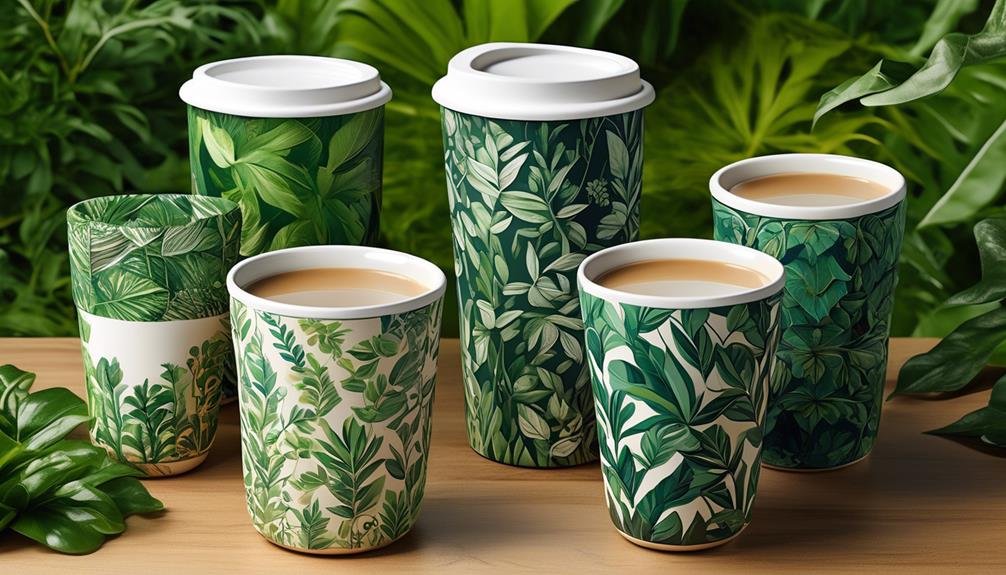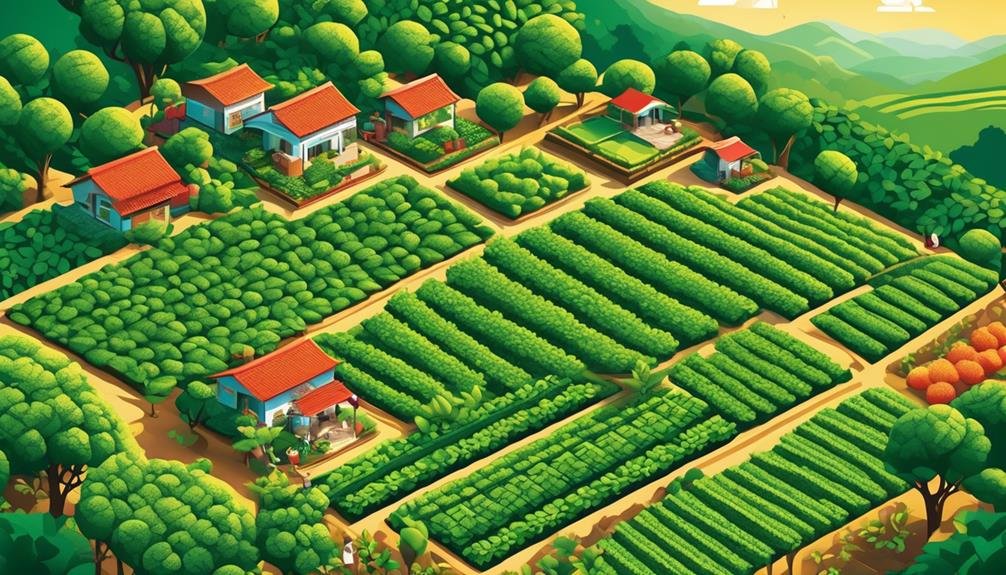Tired of sipping your coffee and tea while secretly wondering if you're singlehandedly destroying the planet? Well, fear not, dear environmentally conscious reader, for there are ways to make your beloved caffeine fix more eco-friendly.
In this discussion, we will uncover some simple yet effective strategies that will leave you feeling like a superhero for the environment. So put down that disposable cup and prepare to embark on a journey towards a greener, guilt-free brew.
Key Takeaways
- Choose brands that prioritize environmentally friendly practices and support fair trade and organic certifications throughout their supply chain.
- Replace single-use cups and filters with reusable alternatives made from durable and sustainable materials.
- Invest in reusable mugs and tumblers to minimize single-use cup waste and enjoy discounts at coffee shops.
- Brew beverages at home to reduce single-use waste, support local businesses, and have control over the strength and flavor of your drinks.
Choose Sustainable Coffee and Tea Brands
When choosing coffee and tea brands, opt for sustainable options to reduce your environmental impact. Look for brands that prioritize environmentally friendly practices throughout their supply chain, from sourcing to packaging. Sustainable coffee and tea brands often work directly with farmers who use organic farming methods, reducing the use of harmful pesticides and promoting biodiversity. They also support fair trade practices, ensuring that farmers receive fair wages and working conditions.
In addition to sustainable farming practices, look for brands that prioritize responsible packaging. Choose brands that use recyclable or biodegradable materials for their coffee and tea packaging. Avoid single-use plastic packaging whenever possible. And if you prefer tea bags, opt for brands that use compostable or organic cotton tea bags instead of those made from bleached paper or plastic.
When buying coffee and tea, consider purchasing in bulk to minimize packaging waste. This can help reduce the carbon footprint associated with transportation as well. Look for local coffee roasters and tea merchants who source their products locally, reducing the distance your coffee and tea travel to reach you.
Ditch Single-Use Cups and Filters
To further reduce your environmental impact, make the switch from single-use cups and filters when enjoying your sustainable coffee and tea. Single-use cups and filters contribute to waste and can take hundreds of years to break down in landfills. By adopting reusable alternatives, you can significantly reduce your carbon footprint and help protect the planet.
Here are four options to consider:
- Reusable coffee cups: Invest in a high-quality, insulated coffee cup that you can use time and time again. Look for options made from materials like stainless steel or glass, as they're durable and easy to clean. Keep your cup with you whenever you're on the go, and ask your favorite coffee shop to fill it up instead of using a disposable cup.
- French press or pour-over coffee makers: Instead of using single-use filters, opt for a French press or pour-over coffee maker that utilizes reusable metal filters. These options not only produce a richer and bolder flavor but also eliminate the need for paper filters.
- Tea infusers or strainers: Replace single-use tea bags with reusable tea infusers or strainers. These allow you to enjoy loose leaf tea while minimizing waste. Simply fill the infuser or strainer with your desired tea leaves, steep, and enjoy.
- Compostable filters and cups: If you prefer the convenience of single-use options, choose compostable filters and cups made from materials like paper or plant-based plastics. These eco-friendly alternatives can be composted instead of ending up in a landfill.
Opt for Reusable Mugs and Tumblers

Consider investing in reusable mugs and tumblers to reduce waste and enjoy your coffee and tea on the go. By choosing reusable options, you can significantly decrease the number of single-use cups and lids that end up in landfills. Reusable mugs and tumblers are designed to be durable, portable, and thermally insulated, keeping your beverages hot or cold for longer periods. They're available in various sizes, materials, and designs to suit your preferences.
When purchasing a reusable mug or tumbler, look for ones made from eco-friendly materials like stainless steel or glass, as these are more sustainable than plastic options. Additionally, ensure that the product is BPA-free to avoid any harmful chemicals leaching into your drink.
Using reusable mugs and tumblers not only helps the environment but also saves you money in the long run. Many coffee shops and cafes offer discounts to customers who bring their own cups, making it a win-win situation. Remember to rinse your reusable mug or tumbler after each use to maintain hygiene and prevent any lingering flavors.
Brew Your Coffee and Tea at Home
Brewing your coffee and tea at home has several benefits that make it a great idea. First, it helps reduce single-use waste. By using your own reusable mug or tumbler, you can eliminate disposable cups, lids, and stirrers, significantly reducing the amount of waste going into landfills.
Second, brewing at home can save you money. Buying coffee or tea from cafes every day can quickly add up. By making your beverages at home, you'll be able to save money in the long run. Additionally, you can experiment with different flavors and blends without breaking the bank.
Third, brewing at home supports local businesses. Purchasing coffee beans or tea leaves from local roasters or specialty shops helps support small businesses in your community. These establishments often offer unique and ethically sourced options that may not be readily available in larger chain stores.
Finally, brewing at home allows you to enjoy a personalized experience. You have complete control over your coffee or tea, from the strength of the brew to the type of milk or sweetener you use. This level of customization ensures that your beverage is tailored to your exact preferences.
Compost Your Coffee Grounds and Tea Leaves

Make the most of your coffee grounds and tea leaves by composting them for a sustainable and eco-friendly solution. Instead of throwing them in the trash, composting allows you to give these waste products a new life as nutrient-rich soil.
Coffee grounds and tea leaves are excellent additions to your compost pile because they're rich in nitrogen, an essential nutrient for plant growth.
To start composting your coffee grounds and tea leaves, simply collect them in a designated container. You can add them directly to your outdoor compost pile or use them to create a separate indoor compost bin. Remember to mix your coffee grounds and tea leaves with other compostable materials, such as fruit and vegetable scraps, yard waste, and shredded paper, to ensure a balanced compost mixture.
As your coffee grounds and tea leaves break down, they'll provide valuable nutrients to your compost and help improve the soil structure. This nutrient-rich compost can then be used in your garden beds or potted plants, reducing the need for synthetic fertilizers and promoting healthy plant growth.
Composting your coffee grounds and tea leaves not only reduces waste but also helps to minimize greenhouse gas emissions. When organic waste ends up in landfills, it decomposes anaerobically, releasing methane, a potent greenhouse gas. By composting at home, you can actively contribute to reducing your carbon footprint and making a positive impact on the environment.
Reduce Packaging Waste With Bulk Buying
To further reduce waste and promote sustainable habits, another eco-friendly step you can take is to minimize packaging waste by purchasing items in bulk. Buying in bulk not only helps you save money in the long run, but it also significantly reduces the amount of packaging waste that ends up in landfills. Here are four reasons why bulk buying is a great option for reducing packaging waste:
- Less packaging: When you buy in bulk, you eliminate the need for individual packaging for each item. Instead, you can bring your own reusable containers or bags and fill them up with the desired quantity of coffee or tea. This reduces the amount of plastic, paper, and other materials used in packaging.
- Lower carbon footprint: Buying in bulk means fewer trips to the store, which reduces transportation emissions. Additionally, bulk items are often packaged in larger quantities, resulting in more efficient shipping and less energy consumption.
- Reduced waste: By purchasing in bulk, you can avoid single-use packaging that often ends up in the trash after just one use. This helps reduce the overall waste generated from your coffee and tea consumption.
- Support for sustainable brands: Many brands that offer bulk options for coffee and tea are committed to sustainability. By buying from these brands, you're supporting their efforts to minimize packaging waste and promote eco-friendly practices.
Support Fair Trade and Organic Certifications

Supporting fair trade and organic certifications for your coffee and tea purchases is a meaningful way to contribute to ethical and sustainable practices. By choosing products that carry these certifications, you can ensure that the farmers and workers involved in producing your favorite beverages are being treated fairly, while also minimizing the negative impact on the environment.
Fair trade certifications guarantee that the farmers are paid a fair price for their products, which helps to improve their livelihoods and support their communities. On the other hand, organic certifications ensure that the coffee and tea are grown without the use of harmful pesticides and chemicals, protecting both the environment and the health of the farmers and consumers.
To help you understand the importance of fair trade and organic certifications, here is a comparison table:
| Fair Trade Certification | Organic Certification |
|---|---|
| Ensures fair prices for farmers | Promotes chemical-free farming |
| Supports community development | Protects the environment |
| Encourages sustainable farming practices | Improves worker health and safety |
| Reduces exploitation of farmers | Minimizes pollution and soil degradation |
| Promotes transparency in the supply chain | Preserves biodiversity |
Frequently Asked Questions
What Is the Environmental Impact of Coffee and Tea Production?
Coffee and tea production have significant environmental impacts, such as deforestation, water pollution, and greenhouse gas emissions. It's important to consider sustainable alternatives, like buying organic, fair trade, and shade-grown products, and using reusable coffee filters and tea infusers.
How Can I Recycle Coffee Pods or Capsules?
To recycle coffee pods or capsules, check if your local recycling program accepts them. If not, some coffee companies offer mail-in programs, or you can try using reusable pods.
Are There Any Alternatives to Single-Use Coffee Filters?
There are alternatives to single-use coffee filters that can help make your coffee and tea habits more eco-friendly.
Can I Compost Tea Bags?
Yes, you can compost tea bags. Just make sure they are made of natural materials like paper or hemp. Remove any staples or tags and add them to your compost bin.
Are There Any Eco-Friendly Alternatives to Plastic Coffee Stirrers or Straws?
To make your coffee and tea habits more eco-friendly, consider using reusable stirrers or straws made from materials like bamboo or stainless steel. These alternatives are more sustainable than plastic and can be easily cleaned and reused.
Conclusion
In conclusion, by making small changes to your coffee and tea habits, you can make a big difference for the environment.
Choose sustainable brands, use reusable mugs and tumblers, brew at home, compost your grounds and leaves, reduce packaging waste, and support fair trade and organic certifications.
These eco-friendly choices won't only benefit the planet, but also enhance your coffee and tea experience.
So, go ahead and enjoy your favorite beverages guilt-free!



